The Rhodesian Ridgeback: Noble Companion and Fearless Protector
Introduction and Breed Background
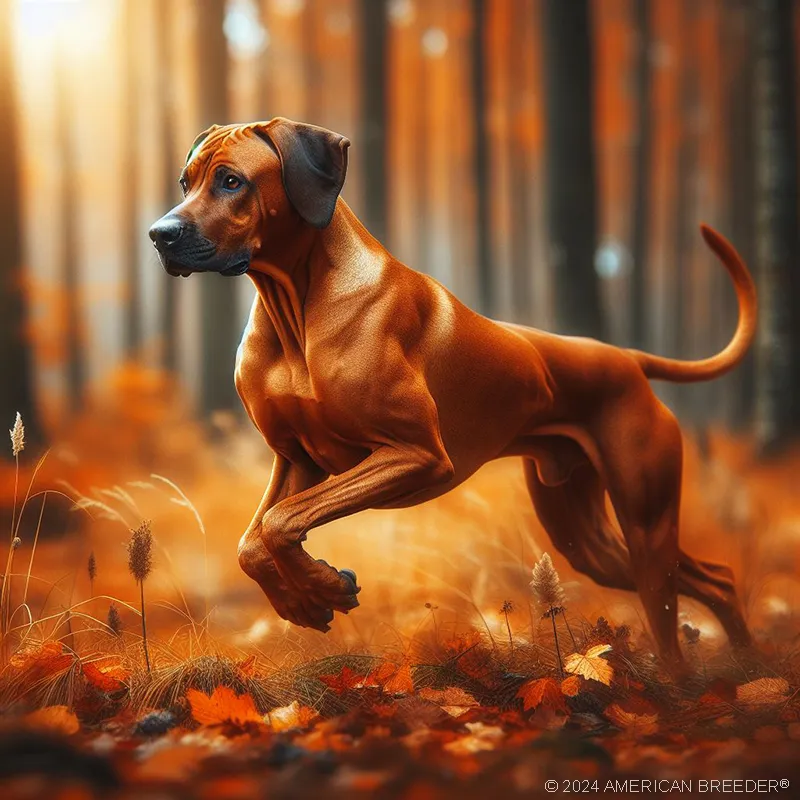 Meet the Rhodesian Ridgeback, a regal and majestic breed known for its striking appearance and endearing personality. Also known as the "African Lion Hound," this breed traces its roots back to the rugged terrain of Zimbabwe, where it was originally developed by European settlers and indigenous tribes for lion hunting and guarding homesteads.
Meet the Rhodesian Ridgeback, a regal and majestic breed known for its striking appearance and endearing personality. Also known as the "African Lion Hound," this breed traces its roots back to the rugged terrain of Zimbabwe, where it was originally developed by European settlers and indigenous tribes for lion hunting and guarding homesteads.
Considerations before welcoming this noble breed into your home are essential. Despite their gentle nature, Ridgebacks are powerful dogs that require an experienced and confident owner who can handle their strength and potential protective instincts. They thrive in an active and loving environment, so if you're ready to provide ample exercise and affection, you'll find a loyal companion for life.
Interesting Facts: Did you know that the distinctive "ridge" on their back is a result of a genetic trait? The ridge, formed by a backward-growing strip of hair, is unique to this breed and has earned them their name.
Breed Background and History
Travel back in time to the 16th century in Africa, where the story of the Rhodesian Ridgeback begins. European settlers, in their quest for a versatile hunting dog, crossed their breeds with the indigenous Khoikhoi's Ridgeback dogs, known for their courage and endurance. The result was a formidable breed perfectly suited for the harsh African landscape.
In addition to their impressive hunting skills, Rhodesian Ridgebacks had cultural significance among local tribes, who considered them as valued companions and protectors. The breed's unwavering loyalty and fierce dedication to their human families quickly earned them a place in the hearts of those who knew them.
Today, the Rhodesian Ridgeback is celebrated and admired worldwide, and its hunting days may be behind it, but its role as a loving and devoted family member has never been more pronounced.
Appearance
Prepare to be captivated by the visual splendor of the Rhodesian Ridgeback. These dogs stand tall and confident, radiating strength and elegance. Males reach heights of 25 to 27 inches, while females stand slightly smaller at 24 to 26 inches. Their well-muscled bodies weigh between 70 to 85 pounds, a testament to their athletic prowess.
 The Ridgeback's short and sleek coat, ranging in color from wheaten to light red, glistens in the sunlight. Their eyes are intelligent and expressive, conveying a sense of understanding and warmth. However, it's the distinctive ridge along their back, created by a strip of hair growing in the opposite direction to the rest of the coat, that sets them apart from all other breeds.
The Ridgeback's short and sleek coat, ranging in color from wheaten to light red, glistens in the sunlight. Their eyes are intelligent and expressive, conveying a sense of understanding and warmth. However, it's the distinctive ridge along their back, created by a strip of hair growing in the opposite direction to the rest of the coat, that sets them apart from all other breeds.
Temperament and Personality
If there's one word that encapsulates the essence of the Rhodesian Ridgeback's temperament, it's "balanced." Beneath their impressive exterior lies a heart of gold, brimming with affection for their human families. They are deeply devoted to their loved ones, and their loyalty knows no bounds.
While Ridgebacks can be reserved with strangers, their gentle and friendly demeanor makes them wonderful companions for families, including children. However, early socialization is crucial to ensure they grow into well-adjusted adults who are comfortable with new people and animals.
Their protective nature, honed through generations as guardians, means that they will watch over their family with great vigilance. But fear not, a well-socialized Ridgeback will distinguish between real threats and harmless visitors.
Trainability and Intelligence
In the realm of intelligence and trainability, the Rhodesian Ridgeback stands head and shoulders above the rest. Their keen minds and desire to please their owners make training an enjoyable and fruitful experience.
Their history as hunting dogs has equipped them with problem-solving abilities, which means they are quick learners when it comes to understanding and executing commands. Engaging in activities like agility training, tracking, and scent work not only keeps them physically fit but also stimulates their agile minds.
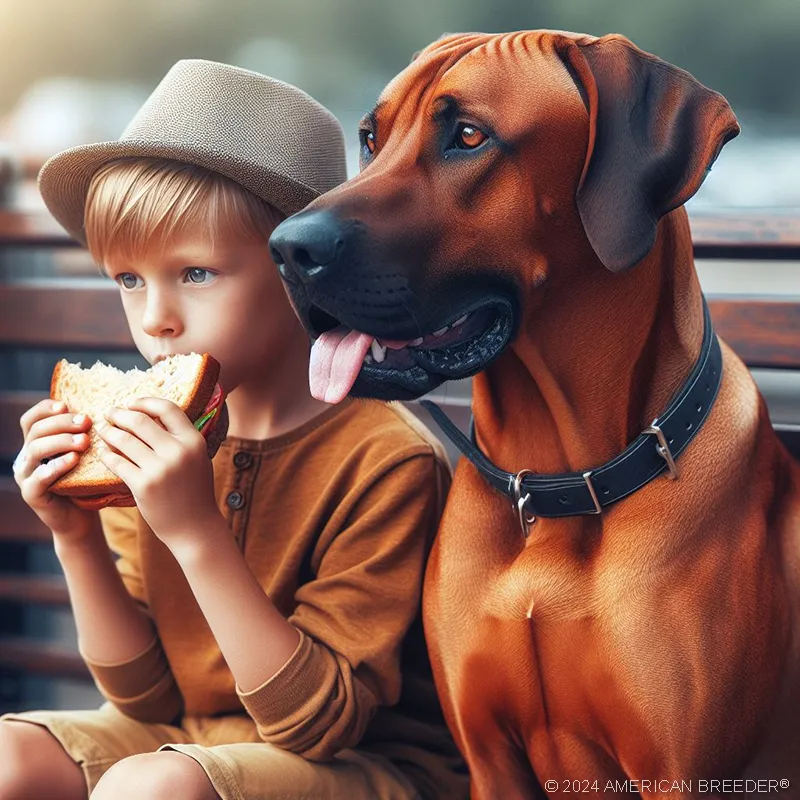 Remember, these are powerful dogs, so positive reinforcement and consistent training methods are the way to go. A well-trained Ridgeback is a well-behaved Ridgeback, making your life as a pet owner smooth and enjoyable.
Remember, these are powerful dogs, so positive reinforcement and consistent training methods are the way to go. A well-trained Ridgeback is a well-behaved Ridgeback, making your life as a pet owner smooth and enjoyable.
Health and Care
Every pet parent wants their furry companion to lead a healthy and happy life, and the Rhodesian Ridgeback is no exception. While they are generally a robust and healthy breed, there are certain health concerns to be aware of.
Hip dysplasia and elbow dysplasia are common conditions that can affect larger dog breeds, including Ridgebacks. Regular visits to the veterinarian, a balanced diet tailored to their nutritional needs, and ample exercise are essential for their well-being.
Keep an eye on their skin too, as they can be sensitive to certain allergies or irritations. Proper grooming and regular baths will keep their coat and skin in top-notch condition.
Remember, a tired Ridgeback is a happy Ridgeback. Their abundant energy requires regular exercise, so make sure they get plenty of opportunities to stretch their legs and enjoy the great outdoors.
Socialization and Compatibility
The Rhodesian Ridgeback's warm and affectionate nature makes them ideal companions for families, including children. Their gentle demeanor around little ones is heartwarming, and they often become the guardians and playmates that children adore.
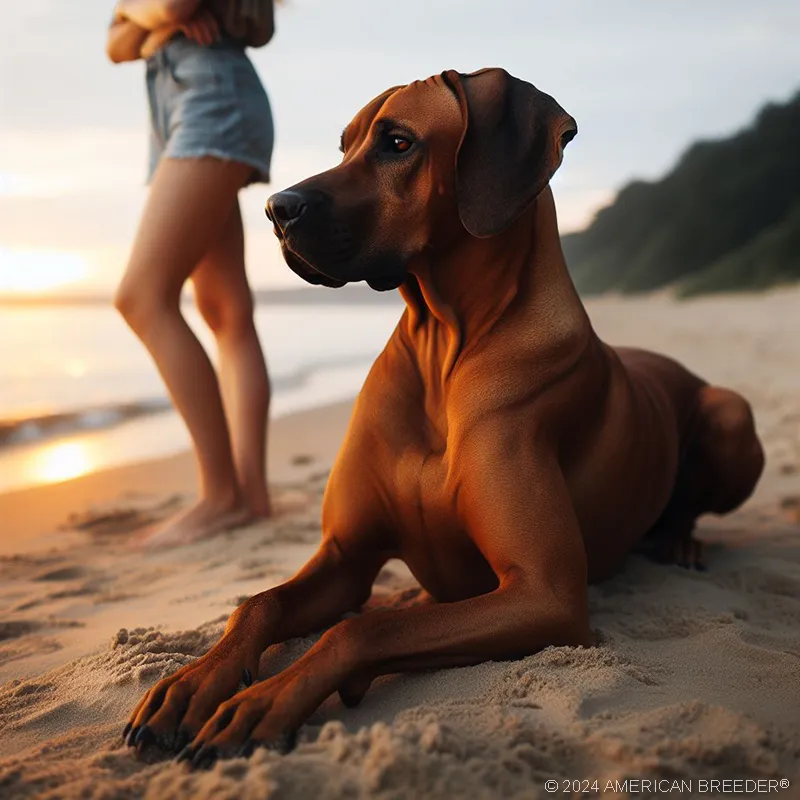 However, their protective instincts may sometimes manifest as reserve around strangers, so early socialization is crucial. Exposing them to various people, animals, and environments from a young age will help them develop into confident and well-adjusted adults.
However, their protective instincts may sometimes manifest as reserve around strangers, so early socialization is crucial. Exposing them to various people, animals, and environments from a young age will help them develop into confident and well-adjusted adults.
With proper socialization, Ridgebacks can coexist peacefully with other pets. It's essential to supervise initial interactions and ensure that all animals feel comfortable in each other's presence.
Living Arrangements and Environment
Adaptability is another charming trait of the Rhodesian Ridgeback. Although they appreciate a spacious yard to roam and explore, they can also thrive in apartment living or urban settings. The key is to provide them with adequate exercise and mental stimulation.
However, be warned that this breed is not meant for couch potato lifestyles. Their boundless energy demands regular physical activities, such as brisk walks, jogging, or engaging in games that challenge their problem-solving abilities.
Training and Obedience
The Rhodesian Ridgeback's intelligence and willingness to please make training a delightful experience. Their history as working dogs means they are quick learners and respond well to positive reinforcement training methods.
Basic obedience training should begin early on to establish boundaries and good manners. As they excel in various dog sports and activities, consider engaging them in advanced training, such as agility, tracking, or even therapy work. These challenges will not only keep them mentally stimulated but also forge a stronger bond between you and your loyal companion.
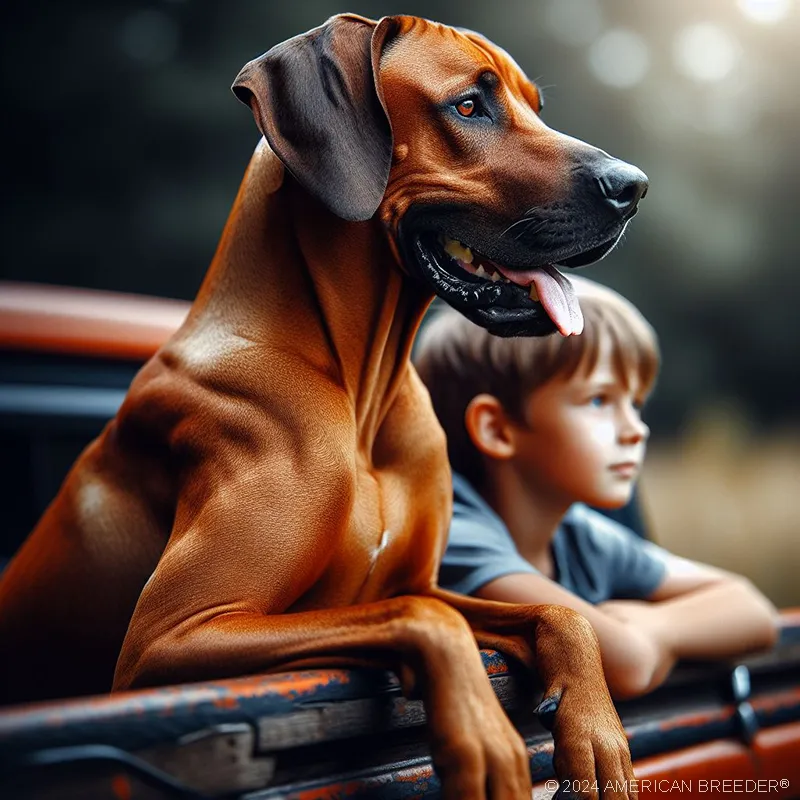 Financial Planning
Financial Planning
Owning a Rhodesian Ridgeback is a lifelong commitment that requires careful financial planning. The initial cost of purchasing from a reputable breeder may range from $1,500 to $3,000, depending on the breeder's reputation and the dog's pedigree.
Beyond the initial purchase, remember to budget for regular veterinary care, vaccinations, spaying/neutering, and microchipping. Yearly veterinary check-ups and preventive medications, such as flea and tick treatments, are essential to keep your Ridgeback in optimal health.
Another significant financial consideration is their dietary needs. A high-quality dog food that meets their nutritional requirements will ensure their overall well-being. Be prepared for the cost of treats, toys, and other supplies that will keep your furry friend happy and content.
While budgeting for the routine expenses is important, it's also wise to consider pet insurance. Pet insurance can help alleviate the financial burden in case of unexpected medical emergencies or accidents. By having insurance, you can focus on providing the best care for your beloved Ridgeback without worrying about the costs.
Overall Summary
The Rhodesian Ridgeback, also known as the "African Lion Hound," is a majestic and noble breed that boasts a striking appearance and a heart of gold. Developed for lion hunting and guarding homesteads, they are fiercely loyal and devoted to their human families.
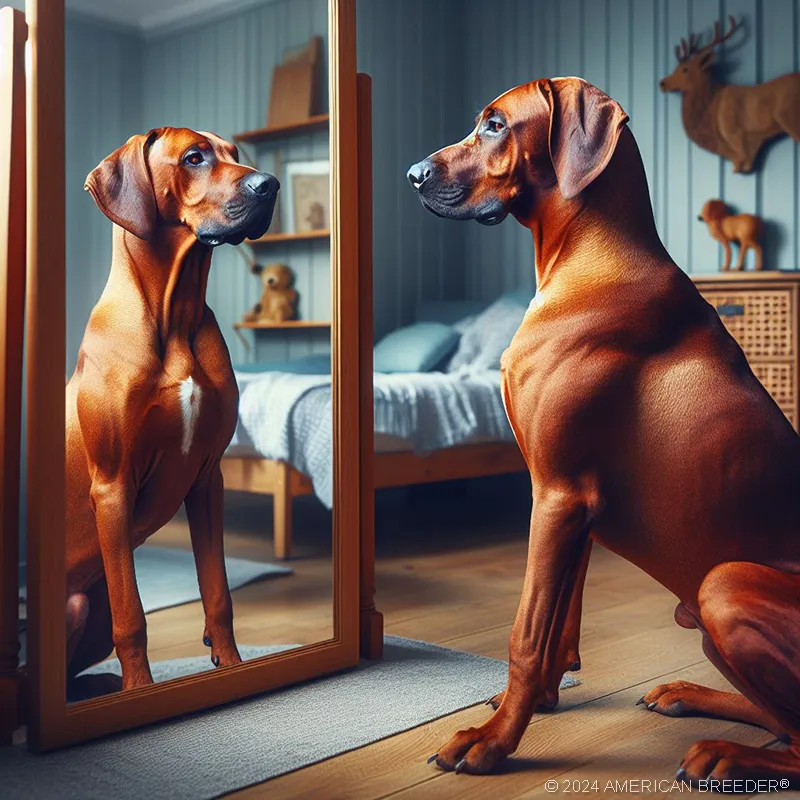 With their keen intelligence and eagerness to please, training these dogs is a delightful experience. Engaging in activities like agility and scent work will keep their minds sharp and their spirits high.
With their keen intelligence and eagerness to please, training these dogs is a delightful experience. Engaging in activities like agility and scent work will keep their minds sharp and their spirits high.
Regular exercise, a balanced diet, and routine veterinary care are essential to keep your Ridgeback healthy and happy. Their boundless energy requires plenty of opportunities to burn off steam.
Responsible ownership involves adopting from shelters or reputable breeders and supporting ethical breeding practices. Familiarize yourself with local regulations and ensure your Ridgeback is well-behaved in public spaces.
Embrace the love, loyalty, and adventure that awaits you with the Rhodesian Ridgeback. They will forever hold a special place in your heart as you create cherished memories together.
Conclusion
Congratulations on choosing to embark on the majestic journey with the Rhodesian Ridgeback! As you prepare to welcome this noble and affectionate breed into your life, remember that responsible ownership is key to fostering a loving and lasting bond.
Through training, socialization, and unwavering care, you will be rewarded with a faithful and devoted companion for life. Embrace the joy, laughter, and love that comes with having a Ridgeback by your side, and savor every moment of this magical adventure together. Wishing you and your new furry friend an extraordinary life filled with wagging tails, playful antics, and unforgettable memories. Happy adventures with your Rhodesian Ridgeback!
Rhodesian Ridgeback Dog Quick Reference Guide
Breed Background: Origin: Southern Africa | Breed Purpose: Hunting and guarding | AKC Class: Hound Group | Year Recognized by AKC: 1955
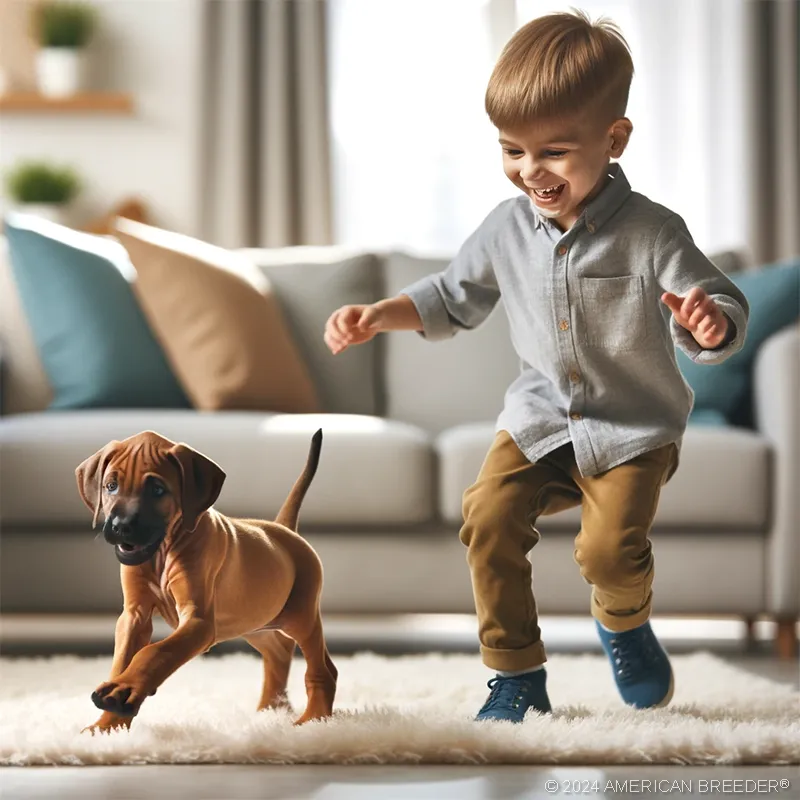 Appearance: Size: Large | Weight: 70-85 pounds | Coat Type: Short and dense | Colors & Patterns: Light wheaten to red wheaten | Distinctive Features: Ridge of hair along the back that runs opposite to the rest of the coat.
Appearance: Size: Large | Weight: 70-85 pounds | Coat Type: Short and dense | Colors & Patterns: Light wheaten to red wheaten | Distinctive Features: Ridge of hair along the back that runs opposite to the rest of the coat.
Temperament: Energy Level: 4 | Friendliness to Pets: 3 | Friendliness to Strangers: 3 | Trainability: 3 | Playfulness: 3 | Frequent Barker: 2 | Chase Instincts: 4 | Sense of Smell: 5 | Drive to Hunt: 5
Health & Care: Health Issues: Hip dysplasia, dermoid sinus, and hypothyroidism | Lifespan: 10-12 years | Grooming Difficulty: Low | Exercise Needs: High
Socialization: Interaction with Children: Good with early socialization | Interaction with Pets: Can be dominant, best with opposite-sex dogs | Interaction with Strangers: Reserved, but not aggressive | Ease of Training: Moderate
Suitable Living Arrangements: Apartment: No | House: Yes | Rural Area: Preferred | Yard Size Requirements: Large, fenced yard
Training & Obedience: Trainability: 3 (Moderate) | Intelligence: 4 (High) | Obedience: 3 (Moderate) | Problem-Solving: 3 (Limited) | Easily Stimulated: 4 (High) | Focus Level: 3 (Moderate) | Easily Distracted: 3 (Moderate)
Financial Planning: Typical Price Range: $800-$2500 | Initial Expenses: Puppy vaccinations, spaying/neutering | Ongoing Annual Expenses: Food, grooming, veterinary check-ups
Breeding: Reproductive Maturity: 18-24 months | Litter Frequency: Once a year | Litter Size: 6-8 puppies | Stud Cost: $1000-$2000 | Breeding Challenges: Selective breeding required to maintain ridge quality.
Did You Enjoy this Article? Share it and Help Us Spread the Word!
If you found this article helpful, we'd appreciate it if you could share it with your friends or link to it from your website, blog, or group! You can also use the convenient social share tabs on the left side of the screen to instantly share this page to your social media feed. For more ways to support and promote the American Breeder Community, visit our Share & Promote Together page for social media posts and memes you can copy and share. Your support means the world to us!
Disclaimer: The information provided in this article is for general informational purposes only and does not constitute legal, medical, financial, or professional advice. While we strive for accuracy, we make no representations or warranties regarding the completeness, accuracy, reliability, or suitability of the information. Please consult with a professional before making decisions based on the content provided. American Breeder Inc. assumes no responsibility for any errors or omissions or for the results obtained from the use of this information.
